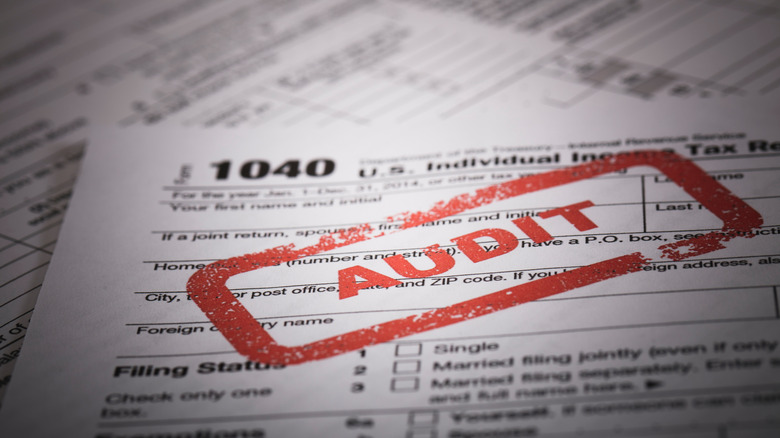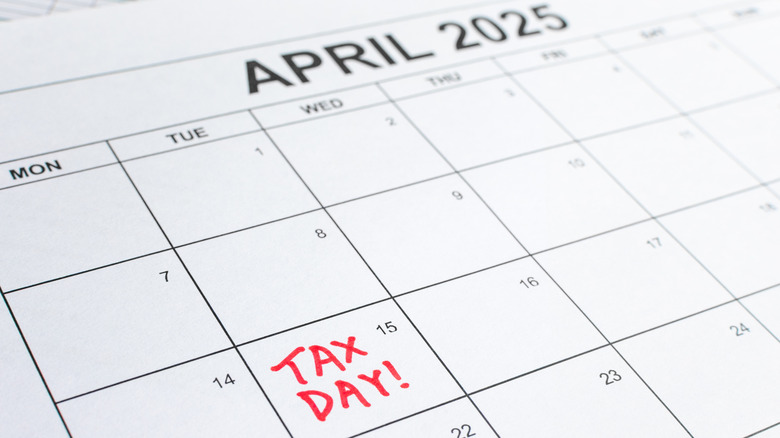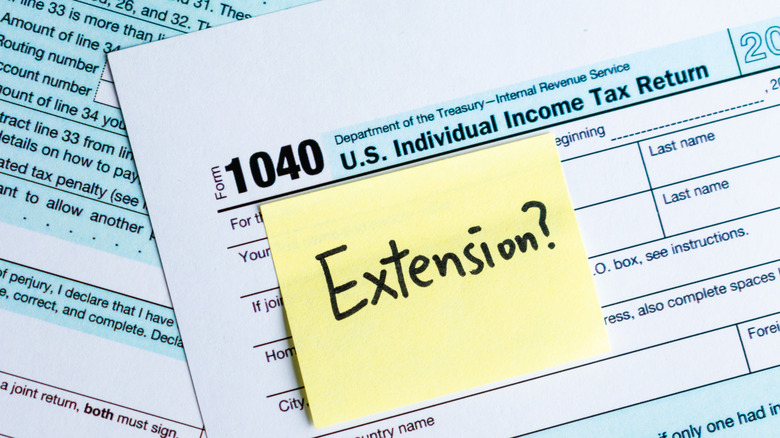The Unexpected Behavior That Increases Your Audit Risk More Than A Tax Extension
The IRS is an organization that can, and does, strike fear into the hearts of even the most law abiding citizens. Every year, Americans have to file their taxes with this wing of the federal government (and state equivalents in some instances), and every year Americans hold their breath en masse. Filers wait for a few tense weeks to see if they'll get their refund check deposited without issue, or if scrutiny may be headed their way. To make matters worse, taxpayers frequently find themselves believing myths about how to limit their exposure.
In reality, very few American taxpayers have to deal with an IRS audit each year, with a total figure of less than 1% flagged for additional investigation during the 2020 tax year. Moreover, taxpayers in both the highest earning bracket and those who claim the Earned Income Tax Credit (and therefore frequently inhabit many of the lower financial demographic segments) see their chances of an audit rise above the rest. While it can be tough to identify strategies and behaviors that can help shift your audit likelihood in your favor, there's actually one specific choice you can make that will significantly improve your chances of avoiding an audit and it has to do with when, exactly, you file.
The unnecessary mistakes of filing last minute
The problem that many filers encounter is timing. The deadline to file every year typically falls on or around April 15th (although this can change depending on some additional factors). As March comes to a close and the calendar increasingly picks up pace toward this deadline, many tax filers begin to feel jittery about getting their submissions in on time. The task of filing taxes is something that can easily be put on the back burner only to surprise people in April — regardless of their intentions. While waiting until the last minute can be stressful, the stress involved isn't the only reason you should avoid tackling your taxes at the last minute.
Filing last minute doesn't inherently increase your risk of being audited, but the unfortunate byproducts that can occur as a result of hastily preparing your taxes absolutely can. Rather than taking the time to get the details correct, filing in a hurry instead increases the chances that you'll ultimately calculate wrong. Doing your taxes wrong is a great way to find yourself receiving an inquiry letter in the mail rather than a check. With that said, there are plenty of Americans who do focus on submitting their tax return early, with about half of U.S. taxpayers reporting they intended on completing their taxes by the end of February, according to the National Retail Federation's 2025 tax return survey.
Extensions may reduce your risk
It's commonly believed that filing for an extension will increase your chances of being audited. Taxpayers may be under the false assumption that anything deviating from a standard submission looks questionable. For this reason, many people rush to avoid missing the original deadline. However, the most important thing to prioritize when filing your tax return is accuracy, not speed. Inaccurate details can lead to delays, and sometimes even penalties or additional scrutiny on top of clarification queries.
In some cases you may be waiting on documents from your investment brokerage provider or workplace. Other delays may be due to unavoidable life circumstances. No matter the reason, your best approach is almost certainly going to be through the use of an extension rather than quickly scraping together an incomplete or inaccurate submission. With this extra time — extensions move the filing deadline to October — you'll be able to calculate your refund amount or payment obligation with greater accuracy while minimizing the risk of additional inspection.
However, there's one thing you should keep in mind. If you owe money to the IRS, paying a rough estimate of your obligation by the original April deadline is crucial. Extensions provide extra time to file, but not to make your payment. Run through your taxes before the deadline — even if you know you'll need an extension. This gives you the opportunity to make an on-time payment if you owe additional money. Importantly, if you end up overpaying, the IRS will refund you the difference.
Make sure you can back up your deduction claims
Building an accurate and complete picture of your income sources isn't the only task that requires detailed attention. Many taxpayers will use an itemized deduction to help offset their tax burden to an even greater extent than the standard deduction can provide. If you're going to itemize your deduction, you should know that everything you claim will need to be supported with legitimate documentation. While you may not be asked to provide key details about many or even any of your itemized write offs, in the event of an audit this paperwork would be required. The fastest way to head off any questions the IRS might send your way is to simply show them the proof. A single question about one of your itemized deductions can quickly unravel into a full blown audit if you can't back it up. Therefore, keeping accurate records to prove your claims can help reduce your audit exposure as well.
Also, your deduction sources shouldn't be overblown. If something doesn't feel like it conforms to common sense -– perhaps you're claiming clothes donations to the tune of thousands of dollars -– then an audit may be in your future. Question marks breed additional scrutiny, so deduction items that stand out as odd or over the top can ultimately draw more attention to your filing than they're worth.



